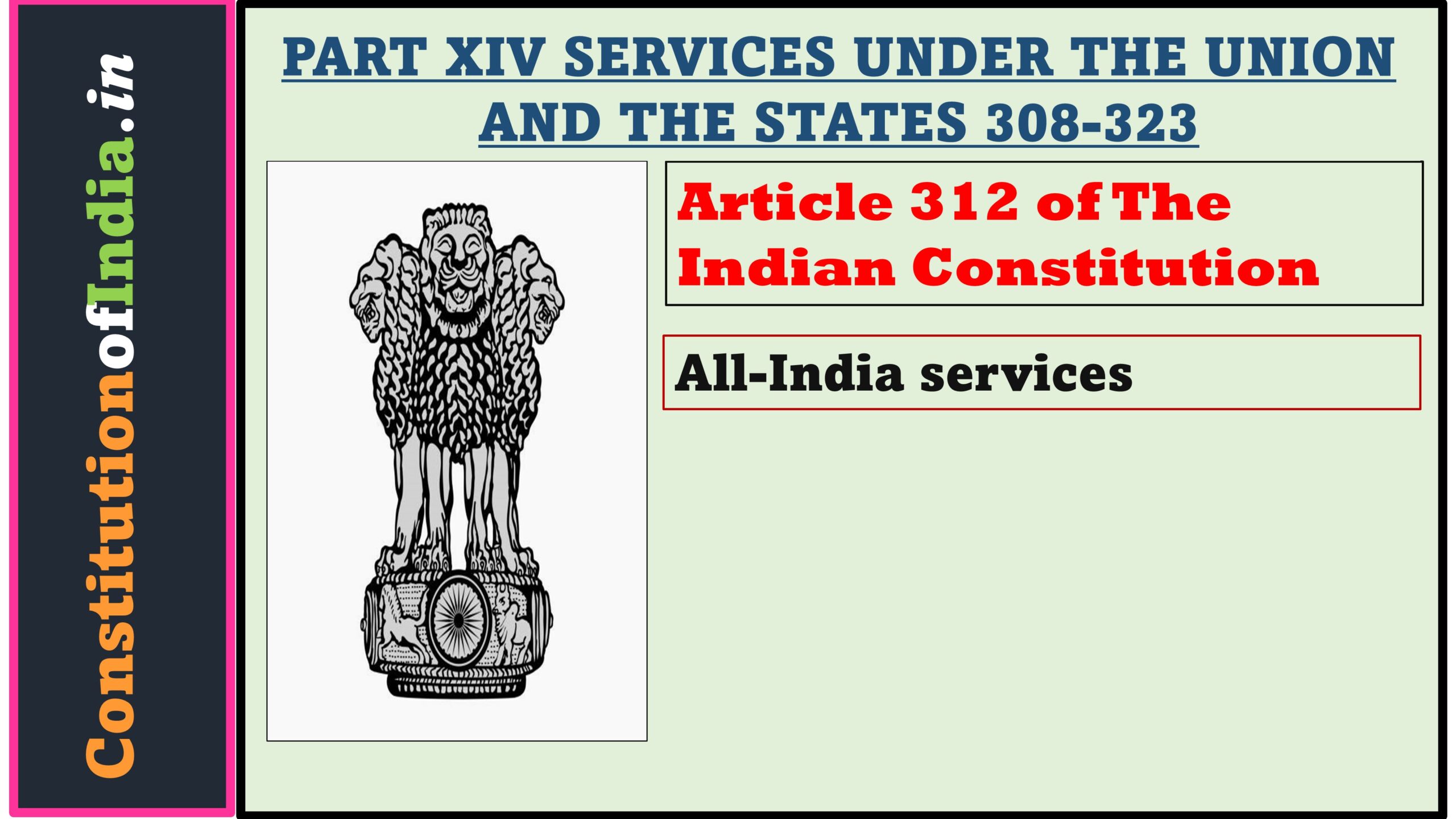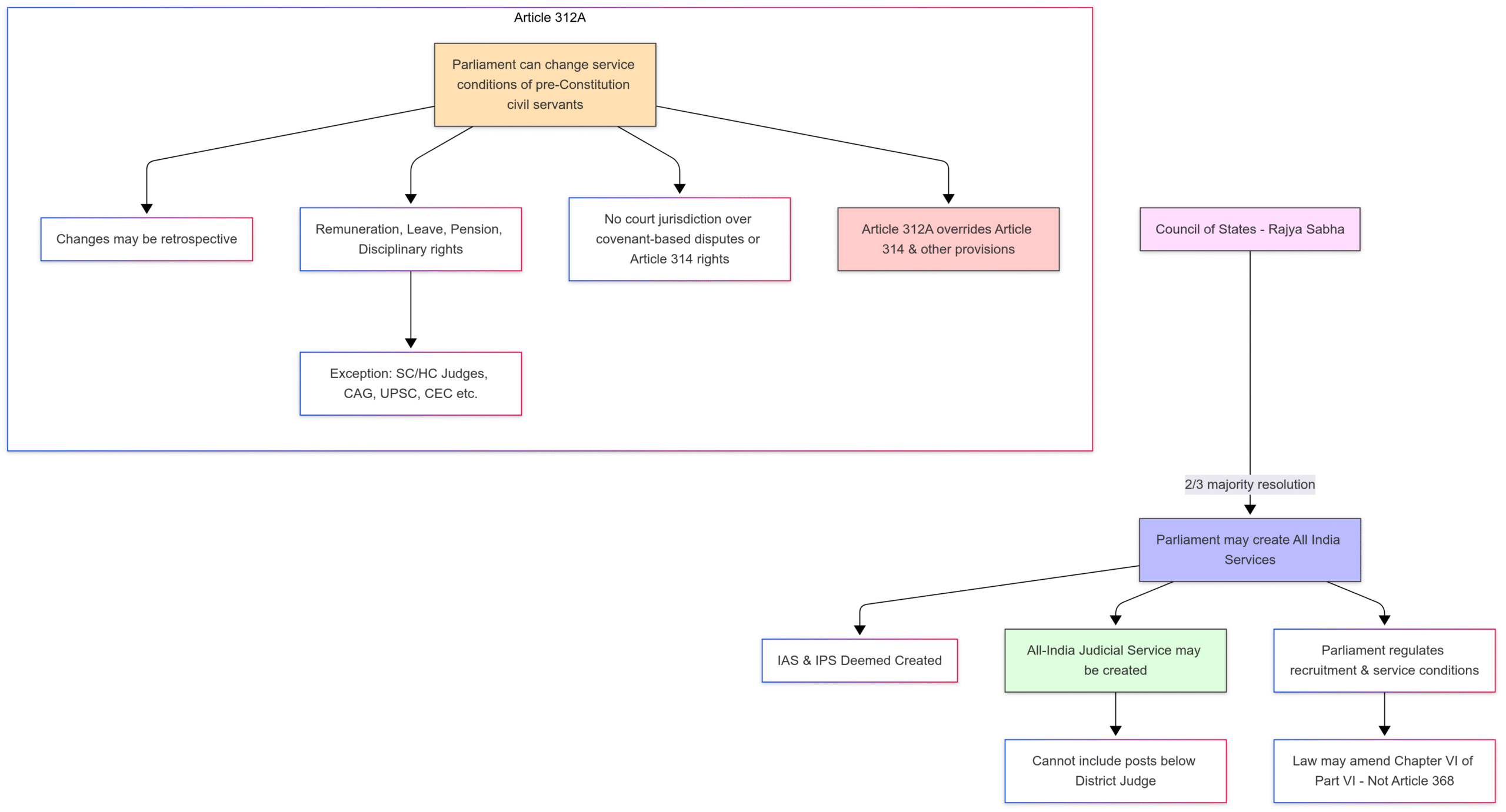Article 312 of Indian Constitution: All India Services.

Article 312 All India Services – Constitution Of India
(1) Notwithstanding anything in 1 [Chapter VI of Part VI or Part XI], if the Council of States has declared by resolution supported by not less than two-thirds of the members present and voting that it is necessary or expedient in the national interest so to do, Parliament may by law provide for the creation of one or more all India services 2 [(including an all-India judicial service)] common to the Union and the States, and, subject to the other provisions of this Chapter, regulate the recruitment, and the conditions of service of persons appointed, to any such service.
(2) The services known at the commencement of this Constitution as the Indian Administrative Service and the Indian Police Service shall be deemed to be services created by Parliament under this article.
(3) The all-India judicial service referred to in clause (1) shall not include any post inferior to that of a district judge as defined in article 236.
(4) The law providing for the creation of the all-India judicial service aforesaid may contain such provisions for the amendment of Chapter VI of Part VI as may be necessary for giving effect to the provisions of that law and no such law shall be deemed to be an amendment of this Constitution for the purposes of article 368.]
Article 312A (1) Parliament may by law— (a) vary or revoke, whether prospectively or retrospectively, the conditions of services as respects remuneration, leave and pension and the rights as respects disciplinary matters of persons who, having been appointed by the Secretary of State or Secretary of State in Council to a civil service of the Crown in India before the commencement of this Constitution, continue on and after the commencement of the Constitution (Twenty-eighth Amendment) Act, 1972, to serve under the Government of India or of a State in any service or post; (b) vary or revoke, whether prospectively or retrospectively, the conditions of service as respects pension of persons who, having been appointed by the Secretary of State or Secretary of State in Council to a civil service of the Crown in India before the commencement of this Constitution, retired or otherwise ceased to be in service at any time before the commencement of the Constitution (Twenty eighth Amendment) Act, 1972: Provided that in the case of any such person who is holding or has held the office of the Chief Justice or other Judge of the Supreme Court or a High Court, the Comptroller and Auditor-General of India, the Chairman or other member of the Union or a State Public Service Commission or the Chief Election Commissioner, nothing in sub-clause (a) or sub-clause (b) shall be construed as empowering Parliament to vary or revoke, after his appointment to such post, the conditions of his service to his disadvantage except in so far as such conditions of service are applicable to him by reason of his being a person appointed by the Secretary of State or Secretary of State in Council to a civil service of the Crown in India.
(2) Except to the extent provided for by Parliament by law under this article, nothing in this article shall affect the power of any Legislature or other authority under any other provision of this Constitution to regulate the conditions of service of persons referred to in clause (1).
(3) Neither the Supreme Court nor any other court shall have jurisdiction in— (a) any dispute arising out of any provision of, or any endorsement on, any covenant, agreement or other similar instrument which was entered into or executed by any person referred to in clause (1), or arising out of any letter issued to such person, in relation to his appointment to any civil service of the Crown in India or his continuance in service under the Government of the Dominion of India or a Province thereof; (b) any dispute in respect of any right, liability or obligation under article 314 as originally enacted.
(4) The provisions of this article shall have effect notwithstanding anything in article 314 as originally enacted or in any other provision of this Constitution.
🛡️ Article 312 – All India Services
🔹 Clause (1): Creation of All India Services
- ✅ Parliament can create one or more All India Services (e.g., IAS, IPS, All-India Judicial Service).
- ✅ Requires:
- A two-thirds majority in the Rajya Sabha (Council of States).
- Declaration that it’s necessary in national interest.
- Parliament can also:
- Regulate recruitment & conditions of service for these services.
🔹 Clause (2): Existing Services Recognized
- Indian Administrative Service (IAS)
- Indian Police Service (IPS)
➡️ Both are deemed to be created under this Article.
🔹 Clause (3): Scope of All-India Judicial Service
- Cannot include posts below District Judge (as per Article 236).
🔹 Clause (4): Amendment Facilitation
- Law for judicial service may amend Chapter VI of Part VI (State Services)
➡️ But this won’t count as a constitutional amendment under Article 368.
🏛️ Article 312A – Conditions of Service (Special Provisions)
🔹 Clause (1): Parliament’s Power to Alter Service Conditions
- Can vary/revoke (even retrospectively):
- Remuneration, leave, pension, disciplinary rights
- Applies to:
- Civil servants appointed before Constitution by Secretary of State.
🚫 Exception:
- Cannot adversely change service conditions of:
- Chief Justice / Judges
- CAG of India
- UPSC / State PSC members
- Chief Election Commissioner
🔹 Clause (2): Legislative Authority Retained
- Parliament’s law under Article 312A doesn’t affect:
- Powers of other legislatures or authorities under the Constitution.
🔹 Clause (3): No Court Jurisdiction
- 🚫 Courts cannot entertain disputes about:
- Pre-Constitution covenants/agreements related to service.
- Rights under Article 314 (as originally enacted).
🔹 Clause (4): Overriding Effect
- Article 312A overrides:
- Article 314 (original version)
- Any conflicting constitutional provision
